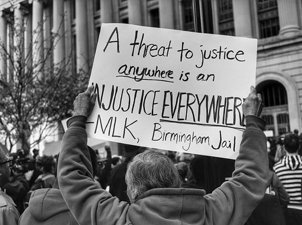
Working With White Folks
Jeremiah Pennebaker
February 24, 2018
“The White Man’s Burden”
“Take up the White Man’s burden—
Have done with childish days—
The lightly proffered laurel,
The easy, ungrudged praise.
Comes now, to search your manhood
Through all the thankless years,
Cold, edged with dear-bought wisdom,
The judgment of your peers!”
-Rudyard Kipling
In the year 2018, in the midst of a glorious Black History Month, and the premiere of Marvel’s Black Panther, I have been thinking a lot about my white friends. This blog is for all my white friends “in the struggle.” The white friends who are “really down” and who really “woke.” Not the, “I would’ve voted for Obama for a 3rd term!” type of woke, but the “How do I become an anti-racist white ally?” woke. I feel like this piece has been written, shared on Facebook, and discussed a million times before, and I’m surely no expert on what it means to white and “woke.” But being who I am, I constantly find myself in places with white people trying to figure it out, or trying to do the right thing, and that’s tough for both parties.
It’s tough because I’m not the friendly neighborhood Black dude who has all the answers to being a good white person as my white friends awkwardly fumble around with a list of Buzzfeed’s “Top 10 Tips to Being a Better Ally!” There’s an ever-present tension that exists in these spaces because racial justice work is messy and vague. There’s a blurred line between Black people not being “teachers” and white people’s inability to do the work themselves because of the privilege of living in a world made for white people. I’m not sure how to resolve or even ease this tension. Mostly because it’s not my fault it’s there nor is it my responsibility to fix.
The problem is that white people are more or less going to be in the wrong when it comes to a lot of racial justice work. No matter how many times you watch “MTV Decoded” or how often you retweet @deray you’re going to show up in places as a white person. The impact of the white gaze on racial justice work and allyship is one that I believe that many of my white friends/ allies may not understand. I don’t fully understand either, but I recognize my feelings around white people as they practice allyship.
I admit I often get frustrated discussing race and racism with my white friends because it begins to feel like my emotions and experiences are being appropriated. Even when the topics don’t necessarily pertain to personal experiences, it still feels as if people are talking about me like I’m not there. I recognize that my white friends mean no harm and that they are trying to be good white people, but I often feel like I’m put on display as they decide the best way to fix my problems.
Now the reason that I write this is not to tell my white friends to back off or to stop doing the racial work that they’re doing. I write this to say that even though there are wounds and you will make mistakes, you must continue to do the work. I write this to tell my white friends to recognize how much space you take up in racial justice spaces. I write this to tell my white friends that just because your name tag says “ally” that it’s not an all-access pass to Blackness. I feel that this is partially my fault because of how many “cookout” invites or pats on the back that were handed out for the most miniscule displays of humanity.
I greatly appreciate the work that is being done, and history has shown that unless we find Wakanda, “progress” is dependent on how much white people are willing to budge. Just recognize that the work being done is just meeting the basic levels of humanity. Malcolm X said something along the lines of, “If you stick a knife in my back nine inches and pull it out six inches, there’s no progress. If you pull it all the way out that’s not progress. Progress is healing the wound that the blow made. And they haven’t even pulled the knife out much less heal the wound. They won’t even admit the knife is there.”
Ultimately, I urge you to take up the white man’s (or woman’s or gender non-conforming person’s) burden and gain the “cold, edged, dear bought wisdom.” What Kipling originally intended as a racist call to colonization is now being thrust back upon you, my white friends, as a call to hold and for you to fully recognize that history and how it impacts the way the People of Color you work with may feel your gaze and your presence. The history, the tension, the anger, and frustration that your peers feel are your crosses to bear, but that does not absolve you of doing the work because at the end of the day it is the right thing to do and working through the tension may just help to ease it.







